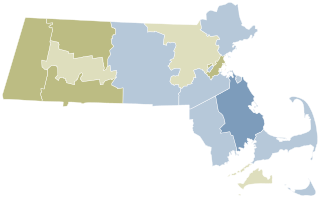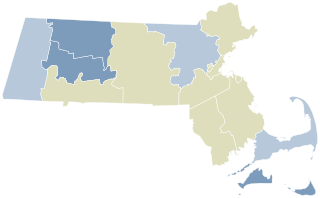The 2006 Massachusetts general election was held on November 7, 2006, throughout Massachusetts.

The Greyhound Protection Act is a Massachusetts statute that gradually eliminated commercial dog racing by 2010. It was enacted as Question 3 on the November 4, 2008 ballot in Massachusetts.
The Motor Vehicle Owners' Right to Repair Act, sometimes also referred to as Right to Repair, is a name for several related proposed bills in the United States Congress and several state legislatures which would require automobile manufacturers to provide the same information to independent repair shops as they do for dealer shops.
A Massachusetts general election was held on November 5, 2002 in the Commonwealth of Massachusetts.
A Massachusetts general election was held on November 8, 1994 in the Commonwealth of Massachusetts.

The No Sales Tax for Alcohol Question, also known as Question 1, was on the November 2, 2010 ballot in Massachusetts. The measure asked voters whether to repeal a sales tax on alcohol sales. The ballot measure for the 2010 ballot was added after the Massachusetts State Legislature increased the sales tax in the state from 5% to 6.25% and eliminated an exemption for alcohol sold in liquor stores.

Massachusetts Question 3, filed under the name, the 3 percent Sales Tax Relief Act, appears on the November 2, 2010 ballot in the state of Massachusetts as an initiative. The measure, if enacted by voters, would reduce the state sales tax rate from 6.25 to 3 percent. The measure was sponsored by the Alliance to Roll Back Taxes headed by Carla Howell. The measure would be enacted into a law 30 days after the election if approved by voters.

Mark James Cusack is an American politician who represents the 5th Norfolk District in the Massachusetts House of Representatives. A member of the Democratic Party, Cusack's district encompasses all precincts in the town of Braintree and Precinct 1 and 2 in the town of Holbrook.

The Massachusetts "Right to Repair" Initiative (2012), also known as Question 1, appeared on the Massachusetts 2012 general election ballot as an initiated state statute. The Right to Repair proposal was to require vehicle owners and independent repair facilities in Massachusetts to have access to the same vehicle diagnostic and repair information made available to the manufacturers' Massachusetts dealers and authorized repair facilities. The initiative passed with overwhelming voter support on November 6, 2012, with 86% for and 14% against. The measure, originally filed four times with the Massachusetts Attorney General, was filed by Arthur W. Kinsman, and was assigned initiative numbers 11–17.

The Massachusetts "Death with Dignity" Initiative, also known as Question 2, appeared on the November 6, 2012 general election ballot in the state of Massachusetts as an indirect initiated state statute to allow physician-assisted suicide. The measure was filed with the Massachusetts Attorney General and would establish, according to those who filed the measure, an "Act Relative to Death with Dignity". The petition number for the initiative was 11-12, and was filed by Michael Clarke as "An Initiative Petition for an Act Relative to Death with Dignity".

The Massachusetts Medical Marijuana Initiative, appeared as the third question on the state's 2012 ballot as an indirect initiated state statute. The measure allows cannabis to be used for medical purposes in the state. The initiative—backed by the American Civil Liberties Union, the Massachusetts Patient Advocacy Alliance, and the Committee for Compassionate Medicine—was filed with proponents turning in the required signatures to the Massachusetts Attorney General's office by the August 3, 2011 deadline. Those signatures were needed for the required ten qualified voters who submitted the original petition to put forward the full text of the law they want enacted. The initiative passed with support from 63% of state voters.
The Massachusetts general election, 2012 was held on November 6, 2012, throughout Massachusetts. Primary elections took place on September 6, 2012.

Cannabis in Massachusetts is legal for medical and recreational use. It also relates to the legal and cultural events surrounding the use of cannabis. A century after becoming the first U.S. state to criminalize recreational cannabis, Massachusetts voters elected to legalize it in 2016.

The Massachusetts Automatic Gas Tax Increase Repeal Initiative, Question 1 was on the November 4, 2014 statewide ballot. Approved by voters, the measure repeals a 2013 law that would automatically adjust gas taxes according to inflation, allowing for automatic annual increases in the state's gas tax.

An Act to Prevent Cruelty to Farm Animals, more commonly known as Question 3, was the third initiative on the 2016 Massachusetts ballot. The measure requires Massachusetts farmers to give chickens, pigs, and calves enough room to turn around, stand up, lie down, and fully extend their limbs. It also prohibits the sale of eggs or meat from animals raised in conditions that did not meet these standards.
Three ballot measures were certified for the November 6, 2018, general election in the state of Massachusetts.
Two ballot measures were certified for the November 3, 2020, general election in the state of Massachusetts. Multiple other ballot measures that were initiated by supporters did not meet requirements, thus will not appear on the ballot.
The 2020 Massachusetts general election was held on November 3, 2020, throughout Massachusetts. Primary elections were held on September 1, 2020.

Massachusetts House of Representatives' 31st Middlesex district in the United States is one of 160 legislative districts included in the lower house of the Massachusetts General Court. It covers Stoneham and Winchester in Middlesex County. Since 2015, Michael Seamus Day of the Democratic Party has represented the district.

Massachusetts Ranked-Choice Voting Initiative, also known as Question 2, was an initiative at the 2020 Massachusetts general election that would have changed primaries and elections in Massachusetts from plurality voting to ranked-choice voting (RCV) for all Massachusetts statewide offices, state legislative offices, federal congressional offices, and certain other offices beginning in 2022. RCV would not be extended to elections for president, county commissioner, or regional district school committee member. The initiative failed, with 54.8% of voters voting 'No' and 45.2% 'Yes'.















